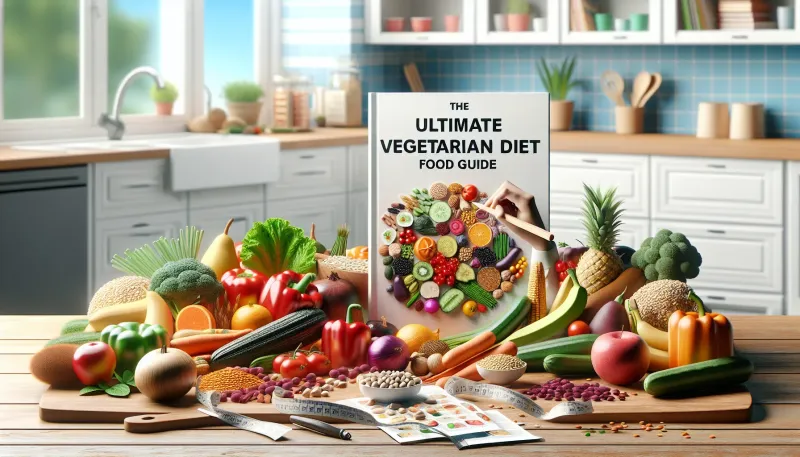Ultimate Vegetarian Diet Food List: Your Go-To Guide

Discover the ultimate vegetarian diet food list to ensure you have a balanced and nutritious diet. Learn what foods to include for a healthy lifestyle.
Adopting a vegetarian diet can be a fulfilling and healthy lifestyle choice. Whether you're new to vegetarianism or a seasoned practitioner, having a well-rounded and comprehensive vegetarian diet food list is essential. In this guide, we'll explore the most nutritious foods to include in your vegetarian diet, addressing common concerns and providing practical advice.
Introduction to Vegetarianism
Vegetarianism is the practice of abstaining from the consumption of meat. People may choose a vegetarian lifestyle for various reasons including health benefits, ethical considerations, environmental concerns, or religious beliefs. A vegetarian diet primarily consists of vegetables, fruits, grains, legumes, nuts, and seeds.
A well-planned vegetarian diet can offer numerous health benefits such as reduced risk of chronic diseases, better heart health, and improved weight management. However, it is crucial to ensure that you’re getting all the essential nutrients your body needs.
Vegetarian Diet Food List
Fruits and Vegetables
- Leafy Greens: Spinach, kale, Swiss chard, and bok choy are rich in iron, calcium, and antioxidants.
- Citrus Fruits: Oranges, lemons, limes, and grapefruits provide a good source of vitamin C and fiber.
- Cruciferous Vegetables: Broccoli, cauliflower, brussels sprouts, and cabbage are high in vitamins K and C, folate, and fiber.
- Root Vegetables: Carrots, sweet potatoes, and beets are excellent sources of beta-carotene, vitamin A, and antioxidants.
- Berries: Blueberries, strawberries, raspberries, and blackberries are packed with antioxidants, vitamins, and fiber.
Whole Grains
- Quinoa: A complete protein that contains all nine essential amino acids.
- Brown Rice: A whole grain that is a good source of magnesium, phosphorus, niacin, and B vitamins.
- Oats: Rich in fiber, particularly beta-glucan, which helps reduce bad cholesterol levels.
- Barley: High in fiber, vitamins, and minerals, and helps maintain blood sugar levels.
- Millet: A gluten-free grain that is a good source of magnesium, phosphorus, and manganese.
Legumes and Beans
- Lentils: Rich in protein, iron, and folate, and low in fat.
- Chickpeas: A versatile source of protein, fiber, and essential vitamins and minerals.
- Black Beans: High in protein, fiber, and antioxidants.
- Kidney Beans: Packed with protein, iron, and folate.
- Peas: Rich in protein, fiber, and a variety of vitamins and minerals.
Nuts and Seeds
- Almonds: High in healthy fats, protein, and vitamin E.
- Chia Seeds: A powerhouse of omega-3 fatty acids, fiber, and antioxidants.
- Flaxseeds: Rich in omega-3 fatty acids, and dietary fiber.
- Pumpkin Seeds: Packed with protein, iron, and magnesium.
- Walnuts: Provide healthy fats, protein, and antioxidants.
Dairy and Dairy Alternatives
- Greek Yogurt: High in protein, calcium, and probiotics, beneficial for gut health.
- Cottage Cheese: A good source of protein and calcium.
- Almond Milk: A low-calorie plant-based milk alternative rich in vitamin E.
- Soy Milk: A high-protein milk alternative that contains essential amino acids.
- Coconut Milk: Offers healthy fats and is commonly used in cooking and baking.
Proteins
- Tofu: A soy-based protein that is low in calories and high in essential amino acids.
- Tempeh: Fermented soybeans that provide a dense source of protein and probiotics.
- Seitan: Made from wheat gluten, it is an excellent source of protein.
- Edamame: Young soybeans that are rich in protein, fiber, and essential nutrients.
- Protein-Rich Vegetables: Foods like mushrooms, peas, and spinach provide additional protein.
Healthy Fats
- Avocado: High in monounsaturated fats, fiber, and various vitamins and minerals.
- Olive Oil: Rich in monounsaturated fats and antioxidants, great for heart health.
- Coconut Oil: Contains medium-chain triglycerides (MCTs) that can boost metabolism.
- Nuts and Seeds: Almonds, chia seeds, flaxseeds, and walnuts are packed with healthy fats.
- Nut Butters: Almond butter, peanut butter, and cashew butter provide protein and healthy fats.
Addressing Common Nutritional Concerns
Protein Intake
One of the most common concerns regarding a vegetarian diet is adequate protein intake. While animal products are known for their high protein content, there are numerous plant-based sources of protein. Including foods such as lentils, beans, tofu, tempeh, and quinoa in your diet can help meet your protein needs. For variety, consider adding protein-rich snacks such as Greek yogurt or nut butter.
Iron
Iron is an essential nutrient that is often a concern for vegetarians. Foods such as spinach, lentils, chickpeas, and fortified cereals are excellent sources of iron. Pairing these foods with vitamin C-rich foods like oranges or bell peppers can enhance iron absorption.
Vitamin B12
Vitamin B12 is primarily found in animal products, so vegetarians need to be mindful of their intake. Fortified foods such as plant-based milks and cereals can provide a good source of B12. In some cases, a B12 supplement may be necessary under the guidance of a healthcare professional.
Omega-3 Fatty Acids
Omega-3 fatty acids are typically associated with fish, but there are plant-based sources available. Chia seeds, flaxseeds, and walnuts are rich in alpha-linolenic acid (ALA), which the body can convert to the omega-3 fatty acids DHA and EPA. Consider also using algae-based supplements for direct sources of DHA and EPA.
Calcium
Calcium is essential for bone health, and while dairy products are traditional sources, vegetarians can obtain calcium from plant-based foods. Leafy greens, almonds, tofu, and fortified plant milks are good sources of calcium. Ensuring regular consumption of these foods can help maintain healthy bones.
Planning a Balanced Vegetarian Diet
Planning a balanced vegetarian diet involves ensuring diversity in your food choices. Eating a variety of fruits, vegetables, whole grains, legumes, nuts, and seeds can help you obtain all the necessary nutrients. It is also beneficial to occasionally review your diet and consult with a nutritionist to ensure you’re meeting your nutritional needs.
Here’s a simple daily meal plan to give you an idea of how to incorporate this vegetarian diet food list:
Sample Daily Meal Plan
- Breakfast: Oatmeal topped with blueberries, chia seeds, and almond butter.
- Lunch: Quinoa salad with chickpeas, spinach, cherry tomatoes, and a lemon-tahini dressing.
- Snack: Greek yogurt with a handful of walnuts and a drizzle of honey.
- Dinner: Stir-fried tofu with broccoli, bell peppers, and brown rice.
- Dessert: A slice of avocado chocolate mousse pie.
Conclusion
Adopting a vegetarian diet can be both nourishing and rewarding when you have a comprehensive and well-planned vegetarian diet food list. By focusing on a variety of fruits, vegetables, whole grains, legumes, nuts, and seeds, you can ensure a balanced and nutritious diet. Addressing common nutritional concerns and planning your meals mindfully will help you thrive on a vegetarian lifestyle. Remember, the key is diversity and regular consultation with healthcare professionals to meet your unique dietary needs.



























